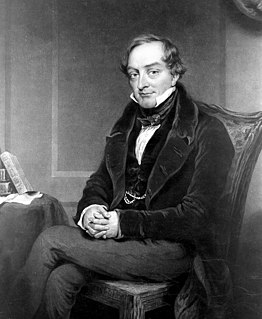A Quote by Franz Joseph Gall
Whoever would not remain in complete ignorance of the resources which cause him to act; whoever would seize, at a single philosophical glance, the nature of man and animals, and their relations to external objects; whoever would establish, on the intellectual and moral functions, a solid doctrine of mental diseases, of the general and governing influence of the brain in the states of health and disease, should know, that it is indispensable, that the study of the organization of the brain should march side by side with that of its functions.
Quote Topics
Act
Animals
Brain
Cause
Complete
Disease
Diseases
Doctrine
Establish
External
Functions
General
Glance
Governing
Health
Him
Ignorance
Indispensable
Influence
Intellectual
Know
Man
March
Mental
Moral
Nature
Nature Of Man
Objects
Organization
Philosophical
Relations
Remain
Resources
Seize
Should
Side
Single
Solid
States
Study
Which
Whoever
Would
Related Quotes
I consider the differences between man and animals in propensities, feelings, and intellectual faculties, to be the result of the same cause as that which we assign for the variations in other functions, viz. difference of organization; and that the superiority of man in rational endowments is not greater than the more exquisite, complicated, and perfectly developed structure of his brain, and particularly of his ample cerebral hemispheres, to which the rest of the animal kingdom offers no parallel, nor even any near approximation, is sufficient to account for.
The student who would build his knowledge on solid foundations, and proceed by just degrees to the pinnacles of truth, is directed by the great philosopher of France to begin by doubting of his own existence. In like manner, whoever would complete any arduous and intricate enterprise, should, as soon as his imagination can cool after the first blaze of hope, place before his own eyes every possible embarrassment that may retard or defeat him. He should first question the probability of success, and then endeavour to remove the objections that he has raised.
What I should like to find is a crime the effects of which would be perpetual, even when I myself do not act, so that there would not be a single moment of my life even when I were asleep, when I was not the cause of some chaos, a chaos of such proportions that it would provoke a general corruption or a distubance so formal that even after my death its effects would still be felt.
The fate of the physiology of the brain is independent of the truth and falsity of my assertions relative to the laws of the organization of the nervous system, in general, and of the brain in particular, just as the knowledge of the functions of a sense is independent of the knowledge of the structure of its apparatus.
You love the person for who they are, flaws and all. You can't help who you love, either. It comes from a different side of your brain than the logic part that tells you that this person is horrible for you - "You should walk away!" While you're walking away, the other part of your brain is trying to gain control of your bodily functions. "Turn around! She's the one!"




































